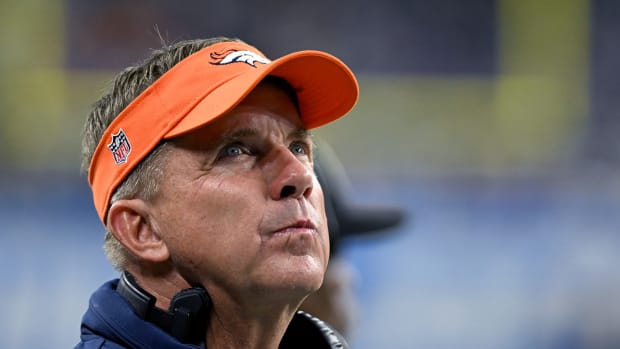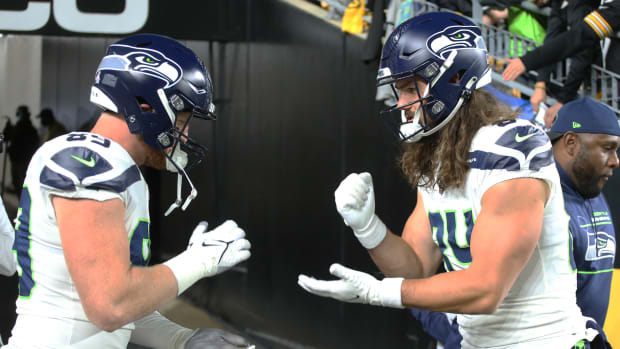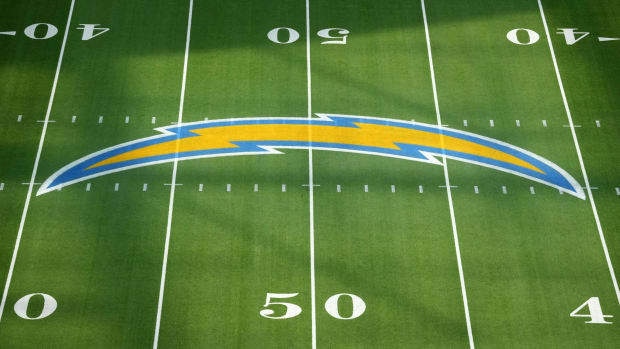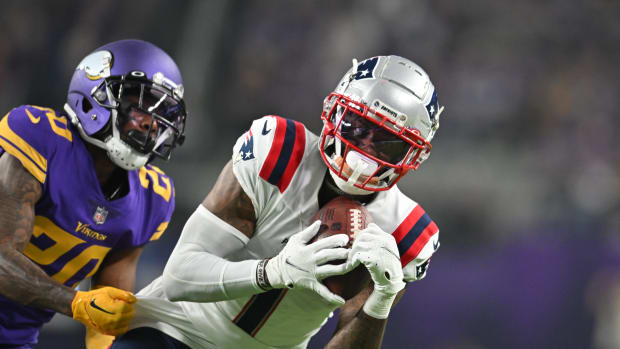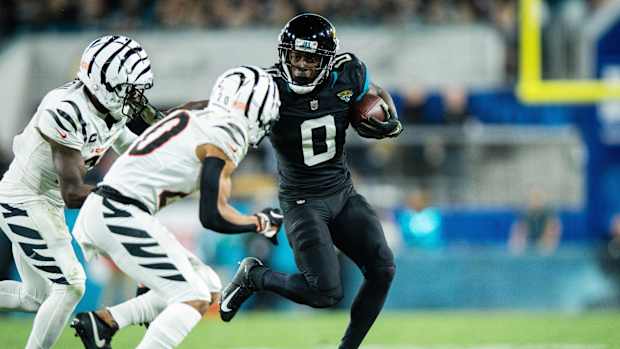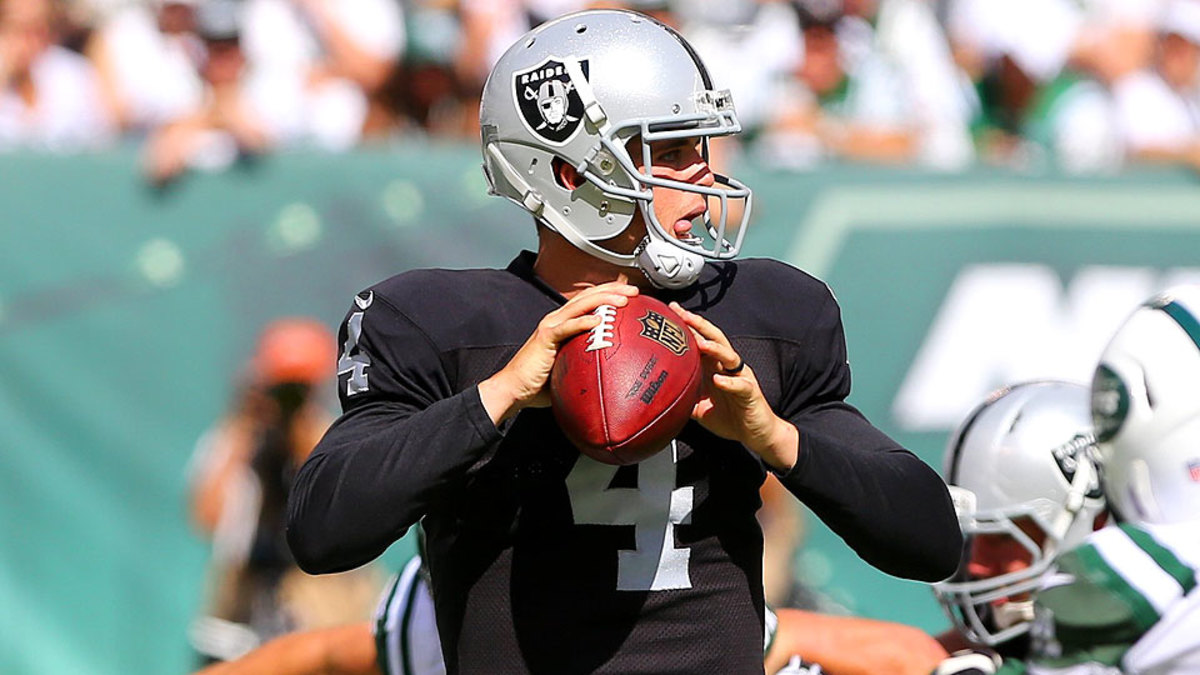
Breaking down why Derek Carr's NFL debut was less than spectacular
The 2014 NFL draft was filled with big-name quarterbacks like Johnny Manziel, Blake Bortles and Teddy Bridgewater, but it was Derek Carr who emerged as the only rookie to start in Week 1. Carr's also the first rookie quarterback in Raiders history to start the opener since the AFL-NFL merger in 1970.
NFL Week 2 picks: Patriots-Vikings, Bears-49ers, Eagles-Colts, more
As a franchise that’s been spinning on the quarterback carousel since Rich Gannon retired a decade ago, the Raiders are desperate for Carr to at least show some positive signs this season that indicate he could be their offensive leader for the foreseeable future.
There were certainly some of those in the Raiders’ 19-14 loss to the Jets on Sunday. There were also more than a few indications that Carr is ill-equipped to light the league on fire -- though some of those reasons are hardly his fault. Here’s a roundup of what we learned about Carr and the Raiders, and what that all means going forward.
Challenge your friends in FanNation's weekly fantasy football game
Carr has solid pass accuracy for a rookie…
Carr completed his first five passes, including a shallow cross to Rod Streater for a 12-yard touchdown one of which was a touchdown when he found Rod Streater on a shallow cross to net a 12-yard touchdown pass on his second drive.
Rookie Watch: Will Hurns' historic performance prove to be a fluke?
He was also 2-for-2 on third downs through two possessions and went into halftime with a 75.0 completion percentage (9-for-12) with 59 yards, a touchdown and no sacks.
At Fresno State, Carr completed 66.6 percent of his passes over three seasons as a starter, but those numbers don’t always translate to the NFL. Nevertheless, he ended Sunday with a 62.5 completion percentage (20-for-32) and no interceptions, which is about all you can ask from a rookie in his first NFL game.
…Except when he’s under pressure
This was the biggest knock on Carr as a draft prospect, as he completed a measly 29 percent of his passes at Fresno State when he was blitzed.
Rex Ryan exploited that in the second half, pushing for more blitzes that immediately brought Oakland’s offense to a screeching halt. Carr was victimized for his first sack and completed three of six passes for just 16 yards in the third quarter, as the Raiders actually netted negative yardage in the period.
Offensive Yards By Quarter | FindTheBest
Carr eventually recovered to lead the Raiders on a scoring drive at the end of the game, but that may have been the result of New York backing off and playing conservatively in garbage time.
If Carr truly never conquered the Jets’ best pass rush efforts, Raiders fans might want to shield their eyes when J.J. Watt and the Houston Texans come to town on Sunday.
NFL Week 2 preview | Complete coverage of the Ray Rice situation
The Raiders aren’t going to let Carr follow in his brother’s footsteps
Derek’s brother, David, was drafted No. 1 overall by the Texans in 2002, their first year in the league. He started immediately, like his younger brother, and was promptly sacked an NFL-record 76 times in his debut campaign. After he eventually flamed out, many -- including Texans owner Bob McNair -- blamed his underwhelming career on the astronomical amount of hits he took from the moment he stepped on the field.
Carr even missed part of the 2003 season after sustaining a shoulder injury while being sacked, and was brought down 3.3 times per game during his tenure with the Texans, about 50 percent more than the average quarterback in a given season.
David Carr's Sack Totals | FindTheBest
The Raiders seemed determined to ensure their second-round pick won’t succumb to the same fate -- which isn’t a bad idea, of course. But Oakland offensive coordinator Greg Olson took this to an extreme, rarely calling any play that required keeping Carr in the pocket for more than a couple seconds. Even though the Jets started seldom-used Darrin Walls and converted safety Antonio Allen at cornerback with former first-rounder Dee Milliner injured, the Raiders rarely challenged them.
Of Carr’s 32 official pass attempts, just four were classified as “deep” by NFL.com, with a fifth earning a defensive pass interference flag. The jury is still out on whether that’s a good strategy -- Carr’s two deep throws to James Jones resulted in a 30-yard touchdown and the pass interference, while all three long balls to Denarius Moore yielded incompletions.
NFL Power Rankings | Sour Rankings: Worst of Week 1
Oakland might be overprotecting Carr at the expense of offensive production
From a protection standpoint, the conservative gameplan worked -- Carr was only sacked twice and didn’t throw an interception. Raiders fans would likely hope, though, that Carr’s 20 completions had produced more than seven first downs.
Oakland also recorded just 158 total yards of offense -- the franchise’s lowest offensive output since 2009, JaMarcus Russell’s last season. If the Raiders’ offense continues to be less productive than it was under the biggest draft bust in franchise history, something obviously has to change.
Smarter Stats: J.J. Watt's longshot MVP campaign off to a strong start
If the Raiders are going to contend this season or at least help their new signal-caller gain meaningful game experience, they’ll have to take the training wheels off Carr at some point. One of his noted strengths coming out of the draft was his ability to throw the deep fade route -- and he showed off that skill on Oakland’s final drive with his bomb to Jones, who led the NFL with 14 touchdown passes for Green Bay just two seasons ago.
Carr ranked first in the FBS last season with 74 completions of 20 yards or more, but Jones’ touchdown was the only such reception on Sunday. Oakland will need to dial up those long balls more often, because their receivers simply aren’t the sort of the speedy playmakers that stack up yards after the catch (YAC). Despite a focus on shallow passes designed to spring long gains after the catch, the Raiders only gained 80 YAC, according to ESPN Stats & Information, the fourth-lowest total across the league in Week 1.
Carr probably won’t have an elite running game as a crutch
Of course, it would be a tremendous help to Carr if Oakland could uncover any semblance of a running game, which was not the case on Sunday. New starting tailback Maurice Jones-Drew, who reportedly suffered a broken hand during the game, had 11 yards on nine carries. Darren McFadden wasn’t much better with 15 yards on four attempts.
The Raiders had hoped Jones-Drew could benefit from a change of scenery after leaving Jacksonville, which is pretty wishful thinking considering the 29-year-old hasn’t topped 1,000 yards or 10 touchdowns since 2009. Rookie quarterbacks simply need more support -- and if Oakland’s running back tandem can’t shoulder their fair share on offense, it could be another long season in The Black Hole.
































